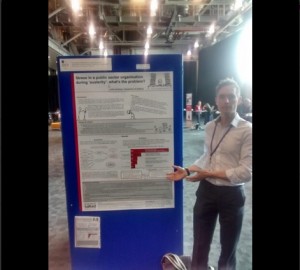By Jenna Condie
To say I spent the summer months during my undergraduate psychology degree sleeping and watching daytime TV is not quite true. I did work a variety of psychology-relevant jobs and pick up the odd book or two. However, I am now aware that I didn’t really make the best use of those breaks to develop my psychological knowledge and skills and ready myself for the graduate job market. Hindsight is a wonderful thing! On that note, here are five ideas for making the most of your summer as a psychology undergraduate. These ideas are inspired by recent opportunities I have noticed or stories I have been told…mostly via Twitter (hint hint!).
1. Volunteering
Most psychology students I speak to are already volunteering for various organisations. A local opportunity I spotted recently (call still open at the time of writing) was for the British Red Cross as a Bridge Group Project Volunteer in Manchester on Wednesday afternoons. The Bridge Group aims to help male refugees and asylum seekers cope with and adapt to a new city and culture. Activities include IT taster courses, tours of the city centre, first aid training and football tournaments. Due to the nature of the work, the volunteering positions are available to males only. Based on my graduate experience of working with ‘hard to reach’ and marginalised communities such as Gypsies and Travellers, I cannot emphasise the value of such experiences for developing communication skills and deepening your understanding of other cultures. At the same time, you could be reading up on psychological theory and research around migration and the processes people go through when adapting to a new place.
Another local opportunity that cropped up in my Twitter newsfeed today was for Mind Manchester, a voluntary organisation that works to improve the lives of people with mental health needs. @ManchesterMind particularly want young people (18-25) and people from ethnic minority backgrounds as these groups are currently underrepresented on their boards.
2. Season work
Get away! Literally! Being a season worker or ‘seasonaire’ can be great fun. To make the most of it, there are a number of ways this experience can be relevant to psychology. For example, companies such as PGL Travel and Esprit Sun have positions that provide relevant work experience for those considering a future career with children and young people. Further afield, there’s also the ever popular Camp America. It could be a bit late for this summer, but next summer maybe?
To combine ideas 1 (volunteering) and 2 (season work), check out organisations that arrange volunteering work in developing countries. SL Volunteers is an organisation that recently grabbed my attention as it is led by students and graduates. Their work is based in Sri Lanka where they run various projects such as The Children’s Home Project. They also have a clinical psychology placement scheme. There are often costs associated with these volunteering schemes but the organisations involved try to keep costs as low as possible. Perhaps you could be enterprising (see below!) and generate some sponsors and/or apply for funding opportunities
3. Enterprise
The organisation mentioned above, SL Volunteers, was established in 2010 by graduates from the University of Manchester and one of the founders, Lucy Nightingale, studied psychology! Maybe you’ve noticed a gap in services for university students – start talking to people across campus who might be interested in your idea.
By enterprising, I don’t necessarily mean starting a business. I mean create something, start something, bring people together with a common goal. If you don’t like the ways things are, change it. You might have an idea to start a group or a Facebook page or a blog for example. There is nothing wrong with starting small but thinking big. Perhaps there are opportunities for you to be ‘intrapreneurial’ (being entrepreneurial within an organisation) within the companies and organisations you are already working for or associated with.
Having the status of ‘student’ attached to you can be a massive advantage for starting an enterprise. If you are at Salford, check out the Careers and Employability Service’s enterprise page: http://www.careers.salford.ac.uk/enterprise.
4. Events
There are lots of events and conferences going on throughout the summer, some of which are free. An interesting event I spotted today (Twitter again!) is a talk by the poet and broadcaster Lemn Sissay MBE called ‘GOOGLE ME’ – A talk on identity from someone finding theirs, organised by the University of Huddersfield (10th July 2013, 6-7.30pm). This is a fantastic opportunity to hear Lemn speak. Here’s a previous talk he gave for TED:
Attending events can give your ideas for dissertations, develop your critical thinking, and provide opportunities for networking. If there is a cost to attend an event, one option is to offer to help out so you can attend for free or at least get a reduced fee (enterprising again!) whilst gaining more work experience. Another option is to offer to write a review or a blog post about the conference or event…this has worked for me in the past and leads nicely onto the final idea for summer.
5. Developing your online presence
Last but not least, you could invest some of your summer into your online presence. Your professional online identity is now crucial for job (and potentially university) applications. Don’t believe me? Just Google ‘Paris Brown’ or ‘EmmaWay20’! A nice starting point for developing your professional self is to create a profile on the professional networking site LinkedIn. Because it’s the most professional of the major social networks, it can help you position yourself differently to how you might do on personal networks such as Facebook for example. We have set up a group on LinkedIn called SPNet to provide a network of students and staff to support each other on this platform and to start making connections with one another.
Another place which I have already mentioned is Twitter. This is the network where I get most of my up-to-date news and information about the latest opportunities…as this blog post demonstrates! For ideas about what to tweet and how to construct a professional self on Twitter, check out the @salfordpsych twitter archive and previous blog posts from current students about using Twitter for professional and learning purposes.
If you fancy going one step further…start your own blog like other Salford Psychology students such as Hannah Smith and Scott Robertson. You can also write guest posts for collaborative blogs. For example, this morning the BPS Social Psychology Section posted a call for blog posts on…you guessed it…Twitter (see below)!
Again, if you are at Salford, the Careers team can help with this and are available during the summer. There’s some drop in sessions too: http://www.careers.salford.ac.uk/page/jobsandcareers
A Psychological Summer
If you are already having a psychological summer, great. Maybe there’s one or two ideas here that you want to follow up or even better, this post has sparked some ideas of your own. I expect the ideas in this post are just the tip of the iceberg…further ideas or suggestions are much appreciated, please leave them in the comments box below. We’d also be really interested to hear about your work experiences over the summer…you can even guest blog about them here!
Contact details: Jenna Condie, Lecturer in Psychology, E: j.m.condie@salford.ac.uk or Twitter: @jennacondie






